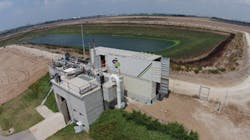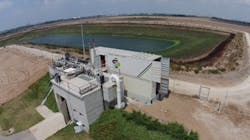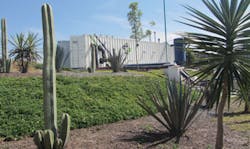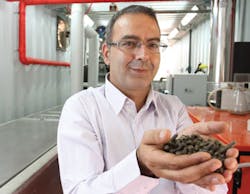There's Gold in them..Wastewaters--Exporting Israel's Paper from Waste Tech
An Israeli technology treats wastewater prior to treatment plants to produce recycled cellulose in the form of pellets. Having partnered with Veolia, signed an order for five plants in Palestine and Jordan and already operating in the UK and Mexico, the company is now looking to take its technology fully global.
By Jeremy Josephs
Dr. Refael Aharon, CEO of Jerusalem-based environmental start-up Applied Cleantech (ACT) had his 'eureka' moment while doing his PhD in plant science at the Weizmann Institute of Science, Israel. At the time he realised how much paper was already collected in wastewater.
"I was thinking about water and wastewater and I said to myself 'hey, there's a lot of paper that was already collected, a lot of cellulose in this water'," he tells WWi magazine.
"Then, step by step, I began to think of the value it could create for the wastewater industry and that contrary to popular belief sewage was not waste but a potential economic asset. Gradually the idea became broader and the value proposition more significant."
Ten years down the line and ACT's Sewage Recyling System enables water treatment plans to bypass the production of sludge by extracting the solid waste before the recycling process begins, and therefore where the cellulose fibres have the highest quality.
So those watchwords associated with the world of sludge - incineration, transportation, fertiliser, landfill (and which represent a significant proportion of costs for traditional wastewater treatment plants) all find themselves neatly bypassed.
This is on the grounds that ACT's technology sifts through wastewater prior to its entry at treatment centres and promptly spits out pellets or pulp form at the end of a conveyor belt in the form of a patented product, called Recyllose - recycled cellulose. The material in the pellets feels like the lint that gathers in clothes dryers and is "completely sterile", according to ACT. Recyllose applications include being used as an additive for pulp and paper, as feedstock for bio-plastics, as an additive to construction and insulation products, as an energy-efficient biofuel and as a resource for the production of biofuel and nanocellulose.
With the technology demonstrating the production of cellulose, have investors and strategic partners been queuing up to join forces?
"Yes and no," he says. "Part of the problem is that the industry is dominated by conservative engineers. And my experience is that when it comes to engineers – well, it's a little like oil and water – they just don't mix. All too often the back-story is one of conservatism and a reluctance to embrace innovation, their attitude invariably 'if it ain't broke, don't fix it' or that when a system does come across as attractive and appealing then to wait for at least 10 years or so to see how it comes out in the wash."
But not all engineers have been sitting on the fence. Far from it. In Holland, energy advisor Job Rosenhart from the Dutch company Agentschap needed little encouragement to sign on the dotted line.
"Every year in the Netherlands we flush at least 170 tons (154 tonnes) of toilet paper down the toilet. Its processing into Recyllose clearly leads to less pressure on the environment, lower water treatment costs and more capacity at the treatment plant."
Partnering with Veolia
Slowly but surely others came forward. United Utilities in Scotland and Vert Energy in Mexico, to name a couple. From the Middle East to North America – wastewater is being seen not as a problem but a massive opportunity. Next came interest from French multinational, Veolia.
"Well, if you think about it, it fits," he says, discussing the partnership. "Of course from our perspective the prospect of partnering is hugely exciting. Not least because they happen to have access to 130 million peoples' sewage systems.
"They are also the biggest company treating sludge in the world. When they see us they realise that it could affect their quantity of sludge - and therefore help to reduce costs - but also that we have a strong product and strong knowhow in this domain."
The CEO adds: "So collaborating with us can lead to improved revenues for them and the figures concerned here are eye-wateringly high - I mean we are talking about billions of dollars. Anyway, on the grounds that you have to start somewhere they now have our system at one of their plants in Troyes in France.
"We are now thinking about how to move forward with them - whether it be via their buying more and more units or of perhaps licensing our technology for the US and Germany- and so on. We are also in talks with other large groups. So this is an exciting time for us, for sure."
Although ACT has its commercial eyes firmly set on established markets such as Western Europe and the US - where issues of environmental awareness loom large - the start-up was keenly aware that there is vast potential in its own Middle Eastern backyard.
It duly signed license agreements with distributors in a joint Jordanian and Palestinian Authorities (PA) venture. Jordanian and PA distributors committed to orders of a minimum of five facilities. But further afield the potential is still vaster.
A recent paper by the Egyptian academic Dr Helaly Abdel Hady Helaly and entitled 'A Vision for Future sludge Management in Alexandria' concluded that the future production of sludge from the city's plants "is expected to exceed 1200 m3/day by 2015, thus the exceeding the capacity of the sludge disposal site. Therefore, the future sewage sludge management represents a critical environmental issue in Alexandria."
What then might be motivating ACT's energetic CEO?
"The initial motivation was not just about money, believe it or not," he says. "My initial thoughts about mining sewage were kind of weird and 'out there' about 10 years ago. But not so now. It's become an entirely mainstream approach - which is great. Because it can impact on the whole of humanity. So that's very daunting and satisfying at the same time. But then you have to take a step back from the big picture and get involved in practical matters."
Nuts 'N' Bolts: How SRS Sewage Mining Works
After screening and grit removal, raw wastewater is pumped into the SRS (Sewage Recycling System). It passes through a primary cleaner to further remove grit. SRS then applies a multi-stage trapping process to mine cellulose and other useful materials out of the flow. Unwanted materials are also separated. Recyllose is heated, pasteurized and processed to over 90% dry matter. Heating is "self-produced" inside the system and "requires no external energy source", according to the firm. Next, dried Recyllose is in paper form and condensed into pellets for storage, transportation and industrial applications, including as a material in the pulp & paper, insulation, construction and bio-plastics industries. On its website, the company says that using SRS, a WWTP treating wastewater from 300,000 people can save between €2200 - €2700 per day.
Jeremy Jospephs is a freelance contributor to WWi magazine. For more information on the article, email:[email protected]
More Water & WasteWater International Archives Issue Articles



